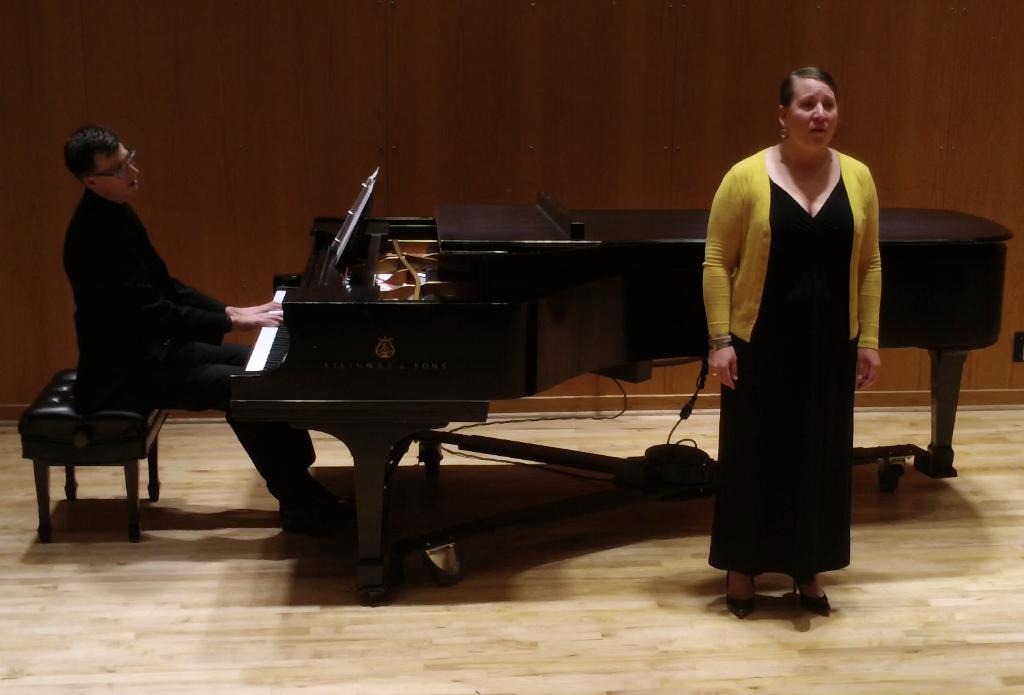French Impressions: Mezzo-soprano Clara Osowski and Pianist Mark Bilyeu on Art Song and French Mélodie (part one)
02 Friday Aug 2013
A Woman’s Paris™ in Interviews
Tags
A French Art Song Companion Graham Johnson Richard Stokes, Académie Francis Poulenc, Adriana Zabala, Aria International Music Festival, Aspen Summer Music Festival, Benjamin Britten, Cameron Stowe, Center for New Music University of Iowa, chamber music, Chicago Choral Artists, Chicago College of Performing Arts, Chicago Folks Operetta, Chicago Opera Playhouse, Chicago Opera Vanguard, Chicago Sun-Times, Chicago Symphony, choral music, Civic Orchestra of Chicago, Clara Osowski, Claude Debussy, Dana Brown, ensemble113, Fran Randall Chicago, France, Francis Poulenc, Francis Poulenc Festival Tours France August 20-30 2013, Francis Poulenc Mélodies, Francis Poulenc Summer Event 2013, François Le Roux, Franz Schubert, French folksong, Interpretation of French Art Song Pierre Bernac, Margo Garrett, Mark Bilyeu, Mark Milyeu, Mary Sauer, Maurice Ravel, mélodie française song-cycle, Meng-Chieh Liu, Metropolitan Opera National Council Upper-Midwest Regional, Minneapolis-Tours Sister Cities Alliance, North Dakota State University, opera, Paris, Paris Conservatory, Poulenc 2013 complete schedule, Robert Jones, Schubert Club Bruce P. Carlson Competition, Stamford Chamber Music Festival Stamford UK, Stephen Paulus, Stephen Swanson, Susan Manoff, The Centre International de la Mélodie Française, The Schubert Club Courtroom Concert Series, Timothy Lovelace, Tours France, Trio Pastiche, University of Iowa, University of Minnesota-Morris, University of Minnesota-Twin Cities, Vancouver International Song Institute, Vancouver Song Institute, VOICES St. Matthews St. Paul MN, Voyage à Paris: Frederica von Stade, Voyage à Paris: Songs of Poulenc
Share it
 (Part two) Mezzo-soprano Clara Osowski and pianist Mark Bilyeu perform mélodie Française song-cycles at the Francis Poulenc Festival in Tours, France, August 20-30, 2013.
(Part two) Mezzo-soprano Clara Osowski and pianist Mark Bilyeu perform mélodie Française song-cycles at the Francis Poulenc Festival in Tours, France, August 20-30, 2013.
Mezzo-soprano Clara Osowski carries her musicianship to all genres of vocal music including opera, chamber, and choral settings. Her opera credits include Ruth, (Pirates of Penzance), Marcellina (Le nozze di Figaro), The Witch and Mother (Hansel and Gretel), Venus (Venus and Adonis), Zita (Gianni Schicchi), Juno (Orpheus and the Underworld), Mother (Amahl and the Night Visitors), Dorabella (Cosi fan tutte), and Cavalier Ramiro (La finta giardiniera). Clara’s passion for contemporary music is exhibited in the song-cycles she has premiered by numerous composers with the Center for New Music at the University of Iowa. She was a 2012 Metropolitan Opera National Council Upper-Midwest Regional Finalist, and was named Runner-Up in the Schubert Club Bruce P. Carlson Competition.
 Clara received her Bachelor of Musical Arts degree with emphasis in Voice from North Dakota State University, and Master of Arts Degree in Voice from the University of Iowa. She received her training from the Vancouver Song Institute (2013), and has studied with Adriana Zabala, Stephen Swanson, and Robert Jones. Clara is an Adjunct Faculty of Voice at the University of Minnesota-Morris. She resides in Minneapolis, Minnesota, and teaches privately out of her home. For additional information, including audio and video performances, visit: (Website) (Twitter)
Clara received her Bachelor of Musical Arts degree with emphasis in Voice from North Dakota State University, and Master of Arts Degree in Voice from the University of Iowa. She received her training from the Vancouver Song Institute (2013), and has studied with Adriana Zabala, Stephen Swanson, and Robert Jones. Clara is an Adjunct Faculty of Voice at the University of Minnesota-Morris. She resides in Minneapolis, Minnesota, and teaches privately out of her home. For additional information, including audio and video performances, visit: (Website) (Twitter)
Pianist Mark Bilyeu, lauded as “superb” by the Chicago Sun-Times, is proving himself a talented and versatile musician. The Chicago native has served as music director with Chicago Opera Vanguard, Chicago Folks Operetta, and ensemble113, and has been seen as pianist with Chicago Opera Playhouse, Chicago Choral Artists, and served as Associate Keyboardist of the Civic Orchestra of Chicago. A committed recitalist, Mark has performed in The Schubert Club’s Courtroom Concert Series in Saint Paul, Minnesota, in the VOICES! at St. Matthews in Saint Paul, the Fran Randall series in Chicago, throughout the Midwestern United States with his piano-horn-voice ensemble Trio Pastiche, and internationally as part of the Stamford Chamber Music Festival (Stamford, UK). Mark has participated in the Aria International Music Festival, the Aspen Summer Music Festival, and most recently in the Vancouver International Song Institute, studying with Margo Garrett and Cameron Stowe. He will return to Vancouver in 2013 as scholarship recipient, and from there will spend a week in New Brunswick, Canada studying French mélodie with Susan Manoff of the Paris Conservatory.
 A graduate of the Chicago College of Performing Arts, Mark holds a Bachelor of Musical Arts degree with emphases in German and the Humanities. There, he studied with pianist Meng-Chieh Liu and vocal coach Dana Brown. Following graduation, he had the privilege of studying with Chicago Symphony pianist Mary Sauer. Mark is currently a student of Timothy Lovelace at the University of Minnesota—Twin Cities, where he recently completed a master’s degree in Vocal Coaching & Accompanying. For information visit: (Website)(Facebook)
A graduate of the Chicago College of Performing Arts, Mark holds a Bachelor of Musical Arts degree with emphases in German and the Humanities. There, he studied with pianist Meng-Chieh Liu and vocal coach Dana Brown. Following graduation, he had the privilege of studying with Chicago Symphony pianist Mary Sauer. Mark is currently a student of Timothy Lovelace at the University of Minnesota—Twin Cities, where he recently completed a master’s degree in Vocal Coaching & Accompanying. For information visit: (Website)(Facebook)
The Centre International de la Mélodie Française and the Académie Francis Poulenc
Mezzo-soprano Clara Osowski and pianist Mark Bilyeu have been selected to perform at the prestigious Francis Poulenc Académie and will participate with art song performers from throughout the world in Tours, France, August 20–30, 2013. For more information visit: (Le Centre International de la Mélodie Française (CIMF)) (Académie Francis Poulenc)(Francis Poulenc Summer Event and Poulenc 2013 Complete Schedule)
The Minneapolis-Tours Sister Cities Alliance
For information visit: (www.mplstours.org)
INTERVIEW: PART ONE
AWP: You are being supported by the Minneapolis-Tours Sister Cities Alliance. How did this come about, what are the plans, and what is it like to collaborate with a non-music based organization?
Mark: It’s by very lucky happenstance that the Poulenc Académie is based in Tours, France, and that Clara and I both live here in Minneapolis! We contacted them [the Minneapolis-Tours Sister Cities Alliance] asking for some advice and potential contacts for housing while in Tours, and they immediately responded. They have been huge assets to us in this project. We are using this first trip to Tours as our initial installment in what we hope is a long-term Art Song Exchange. There are so many wonderful poets and composers based in both cities, we would love to offer a platform for these works, and hopefully, begin a commissioning fund to support these artists’ efforts.
AWP: As musicians, you have great insight into musical structure and color, how sound moves, and how we respond to melody and words—qualities and questions that run throughout the art song genre. What is it about art song, particularly the French mélodie, that delights the ear and brings us such satisfaction?
Clara: The language—the poetry was structured to have its own mélodie before composers identified its pitch. It’s much more pleasing to nuance the shape of the French language than English. I explain to my students that I feel more love in l’amour than l’amour in love… and that’s just the quality of the French vowels.
Mark: When talking about art songs, it’s almost always French vs. German, Debussy vs. Schubert. For me, the extroverted nature of Germanic art song (speaking in large generalities here), reaches out and grabs you, whereas French song stays put, is more demure, and waits for you to approach it. Both these camps have stood the test of time, but I think there’s something very charming and peculiar about French music that grabs us.
AWP: You know the harmonically and structurally complex works of French composers Francis Poulenc (1899-1963), Maurice Ravel (1875-1937), and Claude Debussy (1862-1918). What is it about these turn-of-the-twentieth-century composers that inspires you?
Clara: It’s thrilling to be on the edge of performance, to really stretch creativity and perception, and these composers each advanced the art song in their own way, but maintained a strict attention to detail. The audience has a way to grasp the music emotionally and viscerally while being stretched aurally.
Mark: These three all have such unique musical vocabularies that it’s hard to group them together in a concise answer. Debussy’s harmonic and color palette really move me as a pianist; his writing is so evocative—so perfect—that playing his music is immensely challenging, a life-long work in progress. Ravel’s precision and detail are what grab me when playing his music. Stravinsky once referred to him as the “Swiss watch-maker,” and for good reason: la précision. Ravel was not an innovator, but a genius in formality and ritual. He was able to take musical rubrics (Baroque dances, ancient church modalities) and create something entirely new without ever becoming sentimental. Contrast that to Poulenc, who I would say is the most empathetic of the three. A devout Catholic, he also had the utmost respect for ritual, but emotion was really right there in his writing.
AWP: Did you have a moment of sudden insight early in your career as you moved from the greater musical universe of piano and voice to the comparatively more intimate world of art song performance?
Clara: Absolutely! During a master class I was told that I didn’t have to necessarily make the audience see what I see, but suddenly understand the “feel.” I came to realize that art song is an extension of poetry that can and should be interpreted in individual ways to develop true civility and understanding in our society. The free release and dissolution of the absolute made the art song so much more attractive as a communicative art form.
Mark: My first experience with art song was in my training at the Chicago College of Performing Arts. I was asked by a good friend of mine to accompany him on his senior recital. I had always enjoyed working with other musicians, but my friend’s love of the art song (not to mention his remarkable musicianship) was infectious and truly inspiring.
AWP: What was the most surprising thing you learned about the forms of expression in the French mélodie?
Clara: The most surprising thing to me is the lineage that we find throughout the development of the song. Each composer created from and utilized the best attributes of the composer before, and it’s incredible how the influence has not only developed the quality and scope of the French mélodie, but also the intention and the clarity of the genre.
Mark: Over and over again, when working with actual French musicians, I am chided for using too much rubato (slowing down, speeding up) where it is not marked. “Rubato is not French!” I always want to linger on important words, or slow down to highlight a particular harmonic moment, but for the French that is too sentimental, too wrought. While it’s true that harmony is wonderful, it is most wonderful and effective when presented as itself, not as something to be highlighted. The French are much more refined than I am!
AWP: The essence of the art song, particularly the French mélodie, lies in the subtle interplay between language and poetry, fine distinctions that touch the human spirit with images, sentiments, emotions, and rhythms. Why is this form of music significant, especially today?
Clara: More and more we have to defend the purpose of art, music specifically. Each one of the ideas and emotions that we embrace as performers affects the audience in an individual way. Our connections to each other teach us how to be citizens with compassion and a willingness to be open, and art song really allows the growth of performers and audience in a safe, yet intimate environment.
Mark: Golly, that’s the question, isn’t it? I think it was a lot more significant a hundred years ago than it is now in 2013. When was the last time you walked into a Starbuck’s and saw someone reading Baudelaire’s Les Fleurs du Mal, or saw Pelléas et Mélisande on your Netflix queue? While I think it’s great that everyone in Starbuck’s is reading Fifty Shades [of Grey] (on their e-reader, of course) and Netflix is able to create original programming, nuance is not something our culture promotes—and maybe this is why this music is significant. I keep reminding myself that a composer fell in love with the text before he wrote the music, because the text was rich in all these attributes you mention. I recently had the great privilege to study with Susan Manoff—a pianist who teaches at the Conservatoire de Paris, and I had some amazing moments where she asked me to recite the poetry while covering my own ears. I immediately heard every word, every syllable, every nuance of the language, which I had not experienced before. Most of the world doesn’t take the time to do that kind of work day-to-day, and so I now see that as my mission: to deliver this art in such a way that even the most high-functioning, information-overloaded multi-tasker might be moved by nuance, by discretion, or by sounds that are totally foreign to their daily routine, yet are somehow deeply resonant.
VIDEO PERFORMANCES BY CLARA OSOWSKI AND MARK BILYEU
Maurice Ravel “Le Paon” from Histoires Naturelles
http://www.youtube.com/watch?v=8pf7h9xu8Ts
Claude Debussy “Colloque Sentimental” from Fêtes galantes
http://www.youtube.com/watch?v=F7wMoRasgSY
Aaron Copland “Going to Heaven!” from Twelve Poems of Emily Dickinson
http://www.youtube.com/watch?v=XZY-YDc4agk
RECORDING AND BOOK RECOMMENDATIONS BY CLARE OSOWSKI AND MARK BILYEU
Recordings
Voyage à Paris: Songs of Poulenc, Dame Felicity Lott, soprano; Graham Johnson, piano
Voyage à Paris: Frederica von Stade, mezzo-soprano; Martin Katz, piano
Francis Poulenc Mélodies, Pierre Bernac, baryton; Francis Poulenc, piano
Books
A French Art Song Companion by Graham Johnson and Richard Stokes
Interpretation of French Art Song by Pierre Bernac
Le chant intime : De l’interprétation de la mélodie française by François Le Roux
The Centre International de la Mélodie Française and the Académie Francis Poulenc
The Académie Francis Poulenc was started in 1997 by François Le Roux with the support of the city of Tours, France, the region where Francis Poulenc made his secondary home. Each August, since 1997, the Académie Françis Poulenc has hosted a 10-day series of workshops and performances permitting a limited number of talented young artists to gain further insight into the formalities and nuances of the language and the poetry, along with guidance in musical performance. Le Centre International de la Mélodie Française (CIMF) was founded in the 1990s as a center devoted to the French “chanson” and “mélodie,” and shares its website and mission with the Académie Francis Poulenc which has its own membership association, the Association Francis Poulenc.
For more information visit:
Le Centre International de la Mélodie Française (CIMF)
Académie Francis Poulenc
Poulenc 2013 Complete Schedule
Resources: Following is a list of local resources pertaining to Tours culture.
Mallet Workshop (The Tours ensemble)
La Nouvelle Republique (Tours Newspaper)
Tours Inf0 (The official monthly Tours magazine)
Tours Tourism (A French/English Tours tourism Website)
A Woman’s Paris–Elegance, Culture and Joie de Vivre
We are captivated by women and men, like you, who use their discipline, wit and resourcefulness to make their own way and who excel at what the French call joie de vivre or “the art of living.” We stand in awe of what you fill into your lives. Free spirits who inspire both admiration and confidence.
Fashion is not something that exists in dresses only. Fashion is in the sky, in the street, fashion has to do with ideas, the way we live, what is happening. — Coco Chanel (1883 – 1971)
Text copyright ©2013 Clara Osowski / Mark Bilyeu. All rights reserved.
Illustrations copyright ©Barbara Redmond. All rights reserved.
barbara@awomansparis.com


3 comments
ask said:
February 22, 2015 at 4:14 pm
You actually make it seem so easy with your presentation but I find this matter to be actually one
thing that I believe I would by no means understand.
It kind of feels too complicated and very extensive for me.
I’m taking a look ahead on your subsequent publish,
I will try to get the grasp of it!
preakness odds said:
October 16, 2014 at 5:25 am
You should take part in a contest for one of the greatest websites on the net.
I most certainly will recommend this site!
Bare Minerals skin care treatment said:
June 5, 2014 at 12:34 am
Someone necessarily assist to make significantly posts I might state.
This is the very first time I frequented your web page and
to this point. I amazed with the analysis you made to create this
actual put up amazing. Magnificent task!